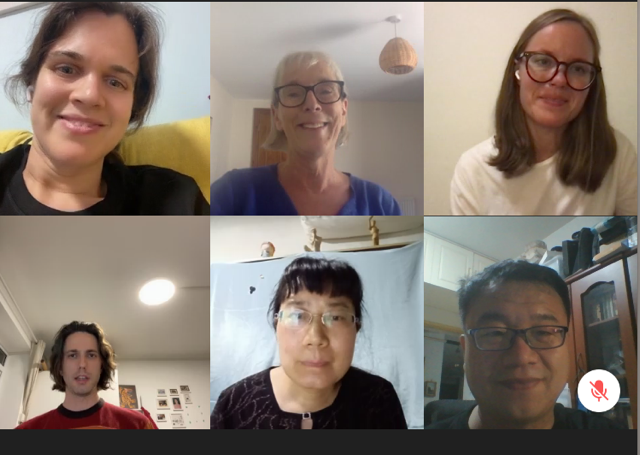A group of us held an impromptu online translation workshop on 5th June 2024. It came about because there were a fair number of people who submitted fully-translated pieces for the new Read Paper Republic "Home" series. We couldn't choose all of the pieces and decided to offer any whose work had not been chosen the chance to join Nicky Harman and Chen Du for an hour-and-a-half session. It was very informative, with everyone contributing. We discussed specific challenges we had while translating, the business of translation, and where to find additional resources. Jessica Morris's detailed notes follow:
Challenges:
Challenge
When translating from Chinese to English it is difficult to convey all of the details while maintaining the conciseness of the original.
Advice Are some details conveyed clearly elsewhere in the text? If so, you can omit these details from the sentence in question in service of style. Keep in mind that the rhythm of the original cannot always be carried over to the translation—the translation will often need to develop a rhythm of its own.
Some Chinese words contain layered meanings. How can you convey all of these in English?
You can use multiple words in English to capture the full meaning of a single Chinese word. This approach can also help differentiate two words with similar meanings.
How can you convey historical or cultural subtext to the English reader?
A translator’s preface can be a great place to explain subtext. If this is not an option, try to use terms that provide a good starting off point if the reader decides to investigate further.
Sometimes a Chinese word can have two or more different meanings. How do you know which is correct?
You can often determine the correct meaning by referencing the internal logic, context, and setting of the original text. What would be the most likely scenario? For example, 胡须can mean beard or moustache, but few Chinese men grow a full beard, so moustache is more likely if the character in question is Chinese.
Following the original text often leads to weird or awkward phrasing in English.
It is ok to include strange or uncommon phrasing in English, but only if you have a good reason for it. Otherwise, it is better to use language the reader will be familiar with.
References to obscure literature in the original can be especially difficult to translate. If you have access to the original author, this is a good time to reach out to them and discuss their reasons for the reference. What should you consider when translating dialogue? Consider the meaning of the dialogue, how the character would express something, and how the audience will receive it.
The Business of Translation:
Beyond translation itself, we also discussed the business of translation including titles and rights. Publishers will often alter the title of a work to better match the market where it is being sold. This varies greatly by country. Have your own suggestions for the title in English, but be flexible. Rights can be tricky. If the author has been deceased for 50 years, their work is in the public domain. If the author is alive, you need their permission and/or the permission of the publisher that holds the rights to their work. For authors who have passed away within the last 50 years, start by contacting the most recent publisher of their work to inquire about rights, or their immediate family members if they can be identified.
Additional resources:
Translators Association (UK): https://www2.societyofauthors.org/groups/translators-association/
ALTA (American Literary Translators Association): https://www.literarytranslators.org/
Emerging Translators Network: https://emergingtranslatorsnetwork.wordpress.com/
Facebook group, Sinologists: https://www.facebook.com/groups/sinologists/
Facebook group, Literary Translation: https://www.facebook.com/groups/351836658289669/
Paper Republic WeChat Group



Comments
I just wanted to thank you for your work. For the last few years Chen Du has been a friend, and the press I direct has published one book of which she is the co-translator. We have more planned for the future. I wonder if you have advice on how to best promote interest in Chinese literature, particularly in the US and UK, and particularly of works by contemporary writers about which English language readers have no knowledge. It seems very difficult to find readers. I'm not even thinking of mass readership, but even hundreds of readers.
Thank you! I wish you well.
Charles Alexander, June 11, 2024, 10:28p.m.